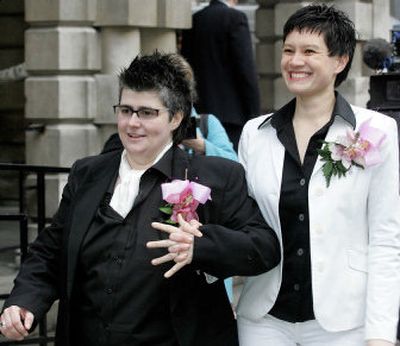Cheers, jeers greet gay couples’ knot

BELFAST, Northern Ireland – The two women strode into City Hall with outsized pink corsages pinned to their black-and-white tailored suits, ignoring the chants of anti-homosexual protesters outside.
The two – Grainne Close, a Northern Ireland social worker, and Shannon Sickels, a New York playwright – emerged from the building after a 30-minute ceremony, smiling and proudly displaying their matching diamond and platinum rings.
Close and Sickels were among the United Kingdom’s first three same-sex unions Monday, when a new British law granting legal status to gay and lesbian couples came into force here first.
As Close and Sickels left, scores of family, friends and gay rights activists tossed flowers and rainbow-colored ribbons in their path.
“This is about making a choice to have our civil rights acknowledged and respected and protected as any human being,” said Sickels, 27, who met her 32-year-old partner in New York four years ago.
More than 700 such marriage-style ceremonies will be repeated today and Wednesday in registry offices across other regions of the United Kingdom – including Elton John and his longtime partner – but almost certainly without Belfast’s exceptional brand of conservatism on display.
Homosexuality itself was outlawed here until 1982, decades after neighboring Britain.
“You need to repent, love,” one of the protesters, the Rev. James Dawson, called out to Brenda Murphy, one of the guests at the first civil partnership ceremony. “This is a travesty, and you’re an abomination before God. God bless you – but first you have to repent of your sins.”
“You would be so lucky to have this lady, love,” Murphy retorted, holding hands with her partner. “I’ll see you at the gates of heaven, mate.”
Christopher Flanagan and Henry Kane, the second couple to arrive at Belfast City Hall, drove up in a pink-stretch limo and kissed amid a deluge of camera flashes. Outside, the crowd of gay rights activists grew to outnumber their evangelical opponents. A gay-rights clown walked about on stilts, while two others donned Hitler-style mustaches and waved satirical placards that read, “Earth is flat” and “Bring back slavery.”
Flanagan, however, emphasized the legal seriousness of the day. Until now, he said, if he was incapacitated or killed, it would have been his gay-averse parents, not his partner, who would make decisions on medical care and receive his inheritance.
“It’s given us legal status behind our relationship, if anything goes wrong,” he said.
Northern Ireland’s police force in May reported a surge in hate crimes against gays over the past two years. As Close and Sickels arrived at Belfast City Hall, an informal poll on Radio Ulster in Belfast registered about 70 percent opposition to civil partnerships.
Although Monday marked the first day for public civil partnership ceremonies, English judges have already granted several gay couples this legal protection, citing emergency circumstances.